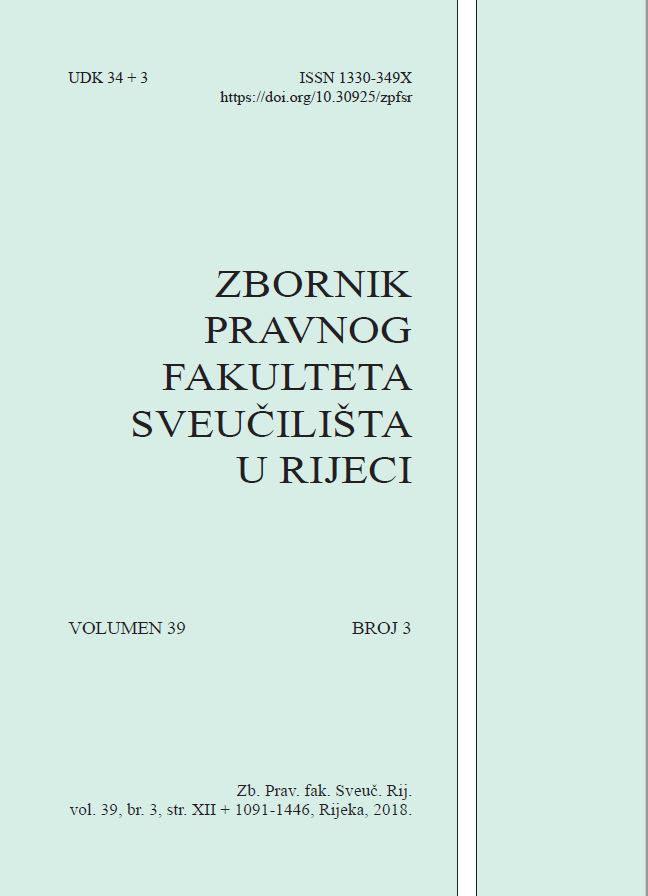COUNTER-OFFER MEASURES ACCORDING TO THE DRAFT ACT ON AMENDMENTS TO THE ACT ON THE TAKEOVER OF JOINT-STOCK COMPANIES
DOI:
https://doi.org/10.30925/zpfsr.39.3.7Keywords:
law of take-over of joint stock companies; counter offering measures; legal position of board of directors and supervisory board; principle of neutrality; board of director’s obligation to conduct company’s businessAbstract
Law on taking over of joint stock companies (Official Gazzette, no. 109/07, 36/09, 108/12, 90/13 and 148/13, hereinafter ZPDD) requires to be reformed, and in any case it requires at least an open public discussion on the position of Board of Directors and Supervisory Board, respectively Management Board of the targeted joint stock company in the procedure of taking over the targeted company. Ministry of Finances established a Working group that discusses and prepares the Draft of the Law on amendments of the Law on taking over of the joint stock companies (Decision CLASS: 011-01/16-01/22 NUMBER: 513-06-03-16-2 of 5th May 2016, hereinafter: Working group). The author, as the member of the working group takes a stand on the reform of the law on taking over joint stock companies in the part that relates to undertaking the counter-offering measures in the procedure of taking
over the joint stock companies and offers concrete suggestions de lege ferenda. The reasons for turn are based on the criticisms of strict neutral position of the Board of Directors and Supervisory Board of the targeted company de lege lata. The strict regulation of Art. 42. Par. 1. of ZPDD-a on so called neutral position of the Board of Directors and Supervisory Board of the targerted company in the procedure of taking
over derogated the basic rule on business conduct of the company from Art. 252 of the Companies Act (Official Gazzette, no. 111/93, 34/99, 121/99, 52/00, 118/03, 107/07, 146/08, 137/09, 111/12, 125/11, 68/13, 110/15; hereinafter ZTD). The aforementioned rule should be therefore de lege ferenda changed so that the values of the domestic
companies law and law governing capital markets, are in the gretest possible measure taken into account. Radical exclusion of the basic standard of conducting companies business in the procedure of taking over de lege lata is not justified. Particularly it is not appropriate from the position of weighing mutually conflicted political interests. The welfare of the targeted company must not be practicaly completely exterminated becaues of so called better interests of the law on taking over of joint stock companies. De lege lata welfare of the targeted company is not, and to say the least, valued enough in the procedure of taking over and in that respect solutions are offered de lege
ferenda. Good example for necessary legal-political and positive legal turn is offered by the provisions of German Wertpapiererwerbs- und Übernahmegesetz (hereinafter WpÜG) which model the author took into account while offering solutions de lege ferenda. The Directive 2004/25 EU on takeover bids (hereinafter Directive 2004/25 EU) rests in that part on optional model.
Additional Files
Published
How to Cite
Issue
Section
License
Collected Papers is an open access journal. Journal does not charge article processing charges (APC) to authors. It is licensed under CC BY-NC licence 4.0.
Collected Papers of the Law Faculty of the University of Rijeka" is an Open Access journal. Users are allowed to read, download, copy, redistribute, print, search and link to material, and alter, transform, or build upon the material, or use them for any other lawful purpose as long as they attribute the source in an appropriate manner according to the CC BY licence.
The papers published in "Collected Papers of the Law Faculty of the University of Rijeka" can be deposited and self-archived in the institutional and thematic repositories providing the link to the journal's web pages and HRČAK.
Upon acceptance of the manuscript for publication by this journal, the author can publish same manuscript in other journals only with the permission of the Editorial Board (secondary publication). A repeated publication should contain a notice as to where the manuscript was originally published.



